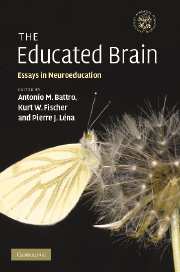Book contents
- Frontmatter
- Contents
- List of figures
- List of tables
- List of contributors
- Preface
- Foreword: Towards a new pedagogical and didactic approach
- Part I The mind, brain, and education triad
- 1 Introduction: Mind, brain, and education in theory and practice
- 2 Historical considerations on brain and self
- 3 Building bridges in neuroeducation
- 4 Mind, brain, and consciousness
- 5 Understanding mind, brain, and education as a complex, dynamic developing system: Measurement, modeling, and research
- Part II Brain development, cognition, and education
- Part III Brain, language, and mathematics
- Index
- References
1 - Introduction: Mind, brain, and education in theory and practice
from Part I - The mind, brain, and education triad
Published online by Cambridge University Press: 22 September 2009
- Frontmatter
- Contents
- List of figures
- List of tables
- List of contributors
- Preface
- Foreword: Towards a new pedagogical and didactic approach
- Part I The mind, brain, and education triad
- 1 Introduction: Mind, brain, and education in theory and practice
- 2 Historical considerations on brain and self
- 3 Building bridges in neuroeducation
- 4 Mind, brain, and consciousness
- 5 Understanding mind, brain, and education as a complex, dynamic developing system: Measurement, modeling, and research
- Part II Brain development, cognition, and education
- Part III Brain, language, and mathematics
- Index
- References
Summary
As the entomologist chasing butterflies of bright colors, my attention was seeking in the garden of gray matter, those cells of delicate and elegant forms, the mysterious butterflies of the soul, whose fluttering wings would someday – who knows? – enlighten the secret of mental life.
Santiago Ramón y Cajal (Recuerdos de mi vida, 1981)Many scientists and educators feel that we are advancing toward new ways of connecting mind, brain, and education (MBE). This feeling arises, in part, because the disciplines related to the cognitive sciences, neurobiology, and education have made considerable advances during the last two decades, and scholars in the disciplines are beginning to seek interactions with each other (Fischer, Bernstein, & Immordino-Yang, 2006). Moreover, the increased connectivity among these disciplines has been enhanced by the growth of communication and information in the globalized world. The “digital environment” of our planet is a new phenomenon in evolution and in history (Battro, 2004), as Rita Levi-Montalcini describes in the preface to this book. We are lucky to live in a time when changes in education can rapidly reach and enrich the lives of millions. This opportunity invites us to foster the coordinated work of scientists, teachers, and students of many nations, races, and religions in the new transdisciplinary field of mind, brain, and education (Léna, 2002, and Koizumi, this volume).
One name for this effort is neuroeducation (Bruer, this volume), which emphasizes the educational focus of the transdisciplinary connection.
Information
- Type
- Chapter
- Information
- The Educated BrainEssays in Neuroeducation, pp. 3 - 19Publisher: Cambridge University PressPrint publication year: 2008
References
Accessibility standard: Unknown
- 3
- Cited by
